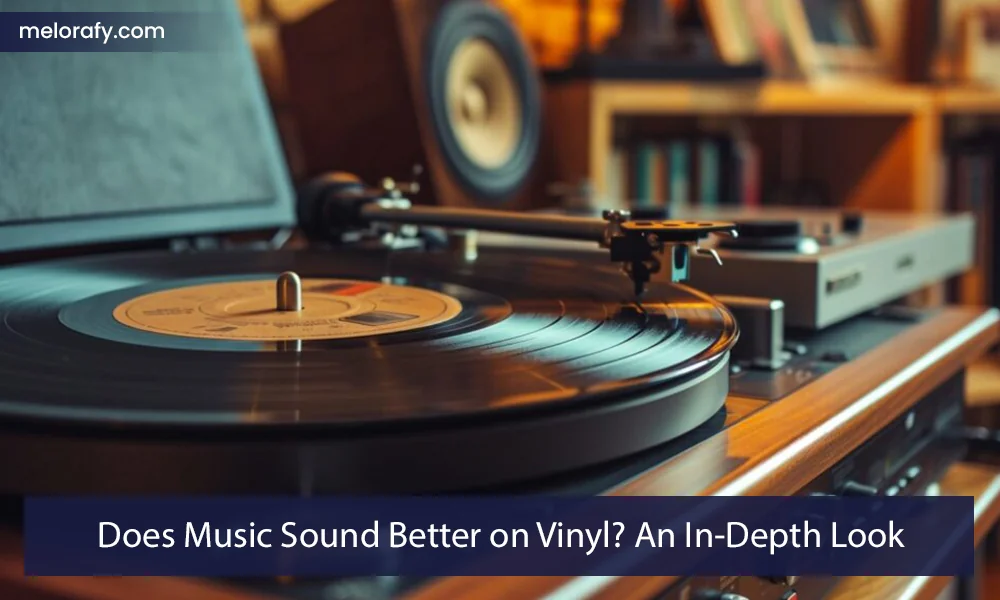
Does Music Sound Better on Vinyl? An In-Depth Look
In an age dominated by digital music, the vinyl record has made a remarkable comeback, appealing to music and music enthusiasts worldwide. This resurgence begs the question: Does music really sound better on vinyl, or is it just nostalgia? This article from Melorafy examines the sound quality of vinyl records compared to digital formats, examines the science behind sound, and why many prefer the vinyl experience.
The Vinyl Experience
Vinyl records offer a unique listening experience that goes beyond just sound quality. The tactile nature of handling records, the artistry of album covers, and the ritual of placing the needle on the record contribute to a more engaging experience. For many, this ritual enhances the overall enjoyment of music, making it feel more personal and immersive.
Sound Quality: Vinyl vs. Digital
To understand why some argue that vinyl sounds better, it’s important to look at the technical differences between analog and digital recordings. Vinyl records are analog, meaning they capture the complete sound wave of a performance. In contrast, digital formats compress audio files, potentially losing some details in the process.
Warmth and Depth
Many vinyl enthusiasts describe the sound of records as warmer and more depthful compared to digital music. This warmth comes from the analog recording process, which can capture the nuances of sound more naturally. Additionally, vinyl playback often includes subtle pops and crackles, which, while technically imperfections, add character and a sense of nostalgia to the listening experience.
![]()
Dynamic Range
The dynamic range—the difference between the quietest and loudest sounds—tends to be wider on vinyl records. This can make the music feel more alive and dynamic. However, it’s worth noting that modern digital formats and recording techniques have significantly improved, offering a dynamic range that rivals or surpasses vinyl in some cases.
The Role of Equipment
The sound quality of vinyl also heavily depends on the playback equipment. A well-maintained turntable, high-quality speakers, and a good amplifier can make a significant difference in the audio output, potentially surpassing the quality of digital music played on average equipment.
Limitations of Vinyl
Despite its appeal, vinyl is not without its limitations. Records are susceptible to wear and tear, which can degrade sound quality over time. Additionally, vinyl playback requires more maintenance and care than digital formats, including regular cleaning of records and stylus replacement.
The Verdict
So, does music sound better on vinyl? The answer is subjective and depends on various factors, including personal preference, the quality of the audio equipment, and the condition of the vinyl record. While vinyl offers a unique and immersive listening experience with potential audio benefits, digital music provides convenience and consistency.
The Psychological Aspect
Music isn’t just heard; it’s felt and experienced. The psychological impact of listening to vinyl records can play a significant role in why some people believe it sounds better. The act of flipping records and the anticipation that builds as the needle drops can heighten the emotional connection to the music. This section can delve into the psychological effects of music and how vinyl may amplify these feelings compared to digital formats.
![]()
The Community and Culture
Vinyl collecting has fostered a unique culture and community. Record stores, swap meets, and online forums create spaces for enthusiasts to share their passion, discover new music, and learn from each other. This sense of community can enhance the vinyl listening experience, making music not just an auditory journey but a social one as well. Exploring this aspect can add depth to your article, showcasing how vinyl goes beyond sound quality to touch on human connections.
Environmental Considerations
In an age where sustainability is increasingly important, discussing the environmental impact of vinyl records versus digital music can offer a fresh perspective. Vinyl production involves PVC, a type of plastic, which raises concerns about its environmental footprint. Conversely, digital music, while seemingly less tangible, still has an environmental cost in terms of data storage and energy consumption. This section can provide a balanced view on the sustainability of music consumption, helping readers make informed choices about their listening habits.
The Resurgence of Vinyl in the Digital Age
Exploring the reasons behind the resurgence of vinyl in an era dominated by streaming services can provide insights into the changing dynamics of music consumption. Factors such as the desire for physical media, the appeal of album artwork, and the quest for high-fidelity sound in a compressed digital world play into this trend. This discussion can highlight the cyclical nature of music formats and what the vinyl revival says about contemporary listening preferences.
![]()
Expert Opinions and Studies
Incorporating insights from musicologists, audiophiles, and industry experts can lend credibility to your article. Interviews or quotes from professionals who can speak to the technical and emotional aspects of vinyl versus digital music will provide a well-rounded perspective. Additionally, referencing studies on sound quality and listener perception can help ground the discussion in scientific research, offering readers a more informed understanding of the debate.
The debate over whether music sounds better on vinyl or digital formats may never be conclusively resolved. However, the resurgence of vinyl in a digital age highlights a desire for a more tangible and enriching music experience. Whether you prefer the warmth of vinyl or the convenience of digital music, the most important thing is the joy and connection that music brings to our lives.